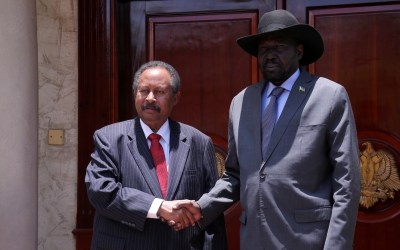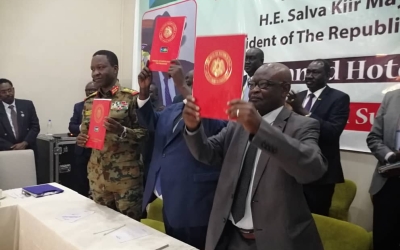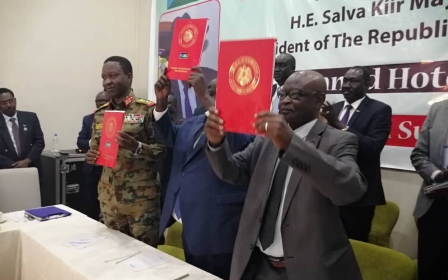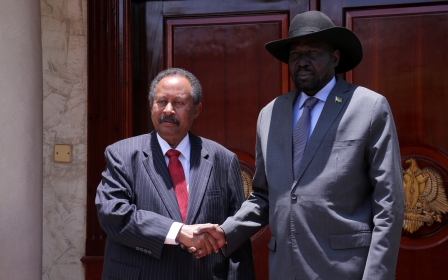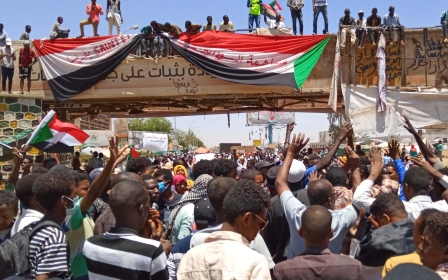Sudanese rebels and government sign ceasefire agreement
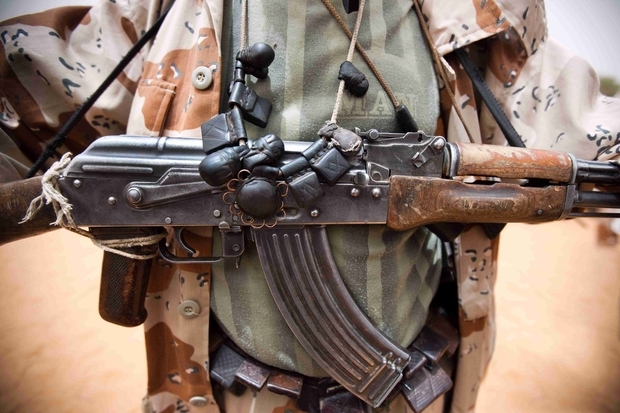
Sudan's government and the rebel coalition of the Sudanese Revolutionary Front (SRF), which represents fighters in areas including Darfur, Blue Nile and South Kordofan, have signed a peace deal in Juba, the capital of South Sudan.
Monday's agreement includes a ceasefire on all fronts of war zones in Sudan in addition to a political declaration.
Khartoum also agreed to let aid into those areas of Sudan, which were cut off from humanitarian groups during former president Omar al-Bashir's rule.
The deal, sponsored by the President of South Sudan Salva Kiir Mayardit, was signed by Alhadi Idriss, the chairman of the SRF, and Mohamed Hamdan Dagolo, known as Hemeti, the deputy chairman of the Sudan Sovereign Council.
The signing ceremony was also attended by representatives of the United Nations, European Union, African Union and the Intergovernmental Authority for Development.
New MEE newsletter: Jerusalem Dispatch
Sign up to get the latest insights and analysis on Israel-Palestine, alongside Turkey Unpacked and other MEE newsletters
Who are Sudan's rebel groups?
+ Show - HideSRF: Sudanese Revolutionary Front
Rebel groups fighting in Darfur, Blue Nile State and South Kordofan formed the SRF in 2011 to unite efforts in talks with the government and have advocated for greater representation for minorities and marginalised communities during Sudan's post-Bashir transition
SPLM: Sudan People's Liberation Movement
Founded by the iconic rebel leader John Garang, who aimed for a democratic Sudan, the SPLM fought a war against the Sudanese state that eventually led to the secession of South Sudan in 2011. It is now South Sudan's ruling party, led by President Salva Kiir.
SPLM/N: Sudan People's Liberation Movement - North (Agar faction)
Garang's allies formed a northern branch of the SPLM after South Sudan's independence to focus on establishing the SPLM's vision of equality in Sudan. In 2011, SPLM-N chairman Malik Agar was removed by Bashir from his elected position as governor Blue Nile state and launched a rebellion that saw him take control of part of the region.
SPLM/N (Alhilu faction)
The group's vice-chair Abdel Aziz Alhilu splintered to create a faction focused on the grievances of South Kordofan, which borders South Sudan, and has become the most influential Sudanese rebel faction, fighting from the Nuba mountains and controlling large amounts of territory.
SLA/AW: Sudan Liberation Army - Abdul Wahid faction
In 2001 leaders from different indigenous Darfuri communities formed the Sudan Liberation Army to fight Bashir's government, claiming they represented Sudan's marginalised communities. The government was accused of carrying out genocide in its response, which used militias known as the Janjaweed to attack Darfuri communities.
Ethnic Fur, Khartoum-educated lawyer Abdul Wahid was the original chairman and now leads his own faction after the group splintered. Since 2016, Sudanese forces have been trying to clear SLA-AW fighters from the Jebel Marra area of Darfur.
SLA/MM: Sudan Liberation Army - Minni Minnawi faction
SLA commander Minni Minnawi, from the Zaghawa herder community, split from Abdul Wahid and formed his own faction. They have had very little presence in Darfur in recent years, basing themselves in neighbouring Libya.
JEM: Justice and Equality Movement
Founded based on grievances about inequality of power in Sudan and with more religious affiliation than other rebel groups, including leaders who were former members of the Islamist movement, JEM eventually became the most powerful Darfuri group. In 2008 it attempted to overthrow the government by storming Khartoum, only halted when they clashed with Sudanese forces in the capital's sister city Omdurman.
Addressing the ceremony at the presidential palace in Juba, Hemeti stressed that the agreement opened a new chapter in Sudan's history.
"We hereby confirm our commitment to making peace in Sudan and to lifting the suffering of the IDPs (internally displaced people), refugees and the victims of the war and to put an end to the injustice in Sudan and to achieve the slogans of our great revolution which are freedom, peace and justice," said Hemeti.
He also noted that they had achieved this breakthrough within seven days, while the former regime had been negotiating with the armed movements for seven years but failed to make any progress.
"I do believe that we achieved this agreement in one week because we showed a strong willingness for peace and for the slogans of the revolution, while you all saw that the former regime has failed to secure it for more than seven years," he added.
Hemeti further commended the efforts of Kiir for sponsoring the peace talks of Sudan.
For his part, Idriss confirmed the commitment of the SRF towards achieving a comprehensive peace in Sudan.
"We were part of the revolution taking place in Sudan and we are still supporting it, but we say that the current transformation that is going on in Sudan can't be stabilised unless we stop the war and make a comprehensive peace," he said.
Kiir called on the Sudanese rivals to continue the dialogue until a final peace agreement could be agreed.
He said that a failure to bring peace to Sudan would create troubles in South Sudan and in the entire region.
"If peace isn't achieved in Sudan, then South Sudan will also be in trouble. So we want to bring the two countries out from these crises and to concentrate only on peace," he said.
Later on Monday, Sudanese Prime Minister Abdalla Hamdok stressed the importance resolving the conflicts.
"These conflict areas are rich in resources, but so far we have failed to use these resources because of conflicts," Hamdok said in a speech broadcast on state television, AFP news agency reported.
"Resolving the conflicts and bringing peace is important for our democracy and for solving the economic crisis," he said.
Secularism demand
Meanwhile, a source close to separate talks in Juba between Sudan's transitional government and the South Kordofan-based Sudan People's Liberation Movement-North (SPLM-N), led by Abdul Aziz Alhilu, disclosed that the talks have stalled.
The source said the SPLM-N, one of the country's largest rebel groups, have asked for the adoption of secularism in Sudan instead of the Islamic laws that were imposed by the Bashir's former regime.
The source, who asked for anonymity because he was not authorised to talk to the media, also revealed that the SPLM-N, which is fighting the government in the Nuba Mountains in the southwest of Sudan, has also called for the self-determination of the Nuba Mountains if secularism is adopted in Sudan.
The Nuba Mountains was the only place that hosted a minority African-Christian community in Sudan after the independence of South Sudan.
On Friday, negotiators for Sudan's transitional government and for the SPLM-N had claimed a breakthrough after reaching an agreement on a timetable and agenda for peace talks.
The two sides had never previously been able to agree on an agenda in 22 rounds of preliminary talks aimed at ending a conflict that has been going on since 2011.
Middle East Eye delivers independent and unrivalled coverage and analysis of the Middle East, North Africa and beyond. To learn more about republishing this content and the associated fees, please fill out this form. More about MEE can be found here.


